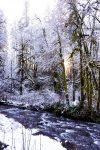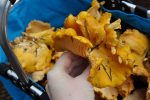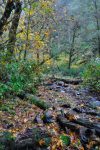Allow me to first apologize for all of my ignorant assumptions about a survivalist lifestyle. I grew up in a life of prudence and subsistence, and I swore I’d never put myself in a position to have to homestead or subsist again.
During the hot summer at the canning tables and fish smoking racks, I swore I’d grow up to live in cities with abundant grocery outlets, fancy cafes, and pastry shops on every corner near my cute little apartment. Never again would my life rotate around a harvest schedule or my weekends spent in hunting tents. But life is funny and makes other plans, often without warning.
For twenty years I enjoyed city life, travel, and the modern conveniences of out-of-season foods with ridiculous transportation costs. Then a string of failed jobs and relationships made me re-think the direction I was moving. I took a job on the wild Oregon coastline and tried to remember what my own voice sounded like. Where had all the windswept tree music and tidal tones been for the last twenty years?
Then, by luck or accident, I stumbled across a piece of land in the Siuslaw National Forest. It was love at first sight, deep and powerful and full of a remembered magic from a childhood I’d tried to escape. I bought a cottage on a creek in the middle of nowhere. There is no cell service and patchy utilities with barely passable roads. There is no internet access or even cable TV. No, that means no satellite access either, due to the density of the forest. I was cut off from the city, my social life, and all commonly accessible conveniences. My agent tried to talk me out of it. My friends warned against it. Locals shook their heads and offered unsolicited advice on firearms I should purchase and opinion on the insanity of a single woman moving to the middle of the wilderness. Still, I was in love with the land, and it seemed like a good idea at the time.
The purchase process was long and convoluted. Getting resources out to the location was a much bigger challenge than expected. Service providers and contractors consistently turned me down for the difficulty of reaching the area.
Within the first month, I needed emergency roof repair from storm damage. The water heater blew and flooded the back room. The water pump went out, followed by the furnace in the worst part of the beginning winter chill, and I didn’t have a wood stove for backup. Then the road suffered several landslides, ice sheeting, and finally a couple of old growth trees across the powerline.
I suddenly, quiet by accident, realized-my childhood of subsistence and homesteading would not only save my life but provide a foundation for rebuilding my future in a more sustainable and positive way. But how would I make that happen?
After a bottle of whiskey and yet another emergency relocation of a rather large forest rodent that I couldn’t identify, plus another warning from the locals about a wildcat in the area, I decided it was time to make a plan. Repair bills were adding up and the list of improvements were chaotic and difficult to prioritize. I was over my head.
On New Year’s Day, 2017, I sat down with my bills, a list of improvements, and a long-term planning spreadsheet. I made notes on the things I thought I could remember how to do by myself and what things I knew I’d need help with. Then, I built out a goal to have my property become entirely self-sustaining by my 40th birthday. How could I earn extra income to help pay for expenses, while lowering my cost of living? How could I be off the unreliable power grid and still be safe and warm through the winter?
Self-sustainability was always a long-term goal of mine, but I’d imagined it as independent wealth and world travel while pursuing my writing dreams. Okay, I needed to make a quick change of plans. Now self-sustainability will be a homesteading capability with producer options, while pursuing my writing dreams. It’s the same end goal but a different pathway to success. I put my project management skills to work and mapped out the order of events needed to turn a one and a quarter acre lot in the woods into a small homesteading paradise.
By my 40th birthday, I hope to be producing for myself, and for friends and family: Eggs, poultry, honey, trout, canned foods, seasonal mushrooms, and wine. I expect to have a guest tiny home and an artists loft on the lot for visitors and guest artists. I hope to be running on hydroelectric power from the creek and be heated only by wood throughout the winter.
It’s with this plan that I intend to be able to focus on my writing and publishing house, and I’ll be supporting myself financially through those means while my property supports my physical needs.
It’s a long way from the Paris cafes of my imaginings, but my love affair with the land and the desire to focus on my passion has re-configured my ideas about survivalist lifestyles. Being thirty miles from resources means, if I’m going to really make this work I need to prepare better. Preparation and prudence can offer me a chance to focus on my real work and afford me the chance to live in a small paradise to boot.
I realized that my childhood of subsistence and land work made me believe the survivalist lifestyle was misunderstood; because we were poor, I assumed survivalist living was about poverty. Because my father was anti-large government, I believed homesteading was about paranoia. Because my mother was anti-relationship, I thought self-sufficiency was about non-community and an introverted mentality. Hence, the apology at the beginning of this story. I was wrong on so many levels. I’m truly sorry for the assumptions of my childhood.
Basically, I’d drawn the wrong conclusion about being independent. It means a lot of different things to a lot of different people. It is whatever you need it to be, and because of the versatility it appeals to all types for a multitude of reasons. Essentially, preparation and prudence is the gateway to a kind of independence that’s entirely new to me.
That being said, there’ve been no shortage of voices trying to convince me to return to the city and give up this life of forest and self making. They’re reminding me nearly daily that the coastal range forest is no place for a single woman. Yet it’s the promise of self making that draws me onward, shushing the arguments and asking instead for solutions to the challenges that don’t involve throwing in the towel.
I broke the process down to reflect the time needed for longer duration needs, such as applying for water permits in the state of Oregon for the hydroelectric turbine, and things like the garden, which will take time to establish. Short term and seasonal tasks can be woven into the timeline based on available funding and level of urgency.
For sure, I’m still figuring out how to be efficient. I’m still figuring out the weather patterns and road conditions, which are currently the most difficult piece of the puzzle. I’m still improvising the basic necessities when the power is out and the phone lines are down, which is fairly regular. I’m still figuring out how to navigate politely around the conversations of people intent on telling me I’m making a huge mistake or have no business being so far out of town. It’s a more frequent unsolicited topic than it should be, but it reaffirms my desire to be successful in the adventure.
Ultimately, the moment I saw the land, the creek, and the forest, I knew I was meant to live here. I was smitten. I didn’t mean to be a survivalist; I hadn’t planned on setting up a homesteading plan. It caught me by complete surprise. Hours on the Internet at the library and loads of books are helping me remember the basics. I’m certain that my childhood prepared me for the things I’ve needed to quickly acclimate to, and I’m grateful for the early teachings. I owe my parents a huge thanks, while I chow a lot of humble pie.
The more I build out the plan, the more I realize the gaps in my education, skills, and resources, and it’s forcing me to be more inventive, creative, and resilient. The adventure isn’t without irony or humor. The first time I chased the thieving raccoon through the woods in my skivvies to retrieve the vent cap, or danced across the kitchen to escape a lizard that had made his way up through the plumbing access, or the moment I found myself buying a chainsaw from a stranger in the parking lot of the furniture store, I realized I’m a long way from my old sense of normal. Normal needs a new relative.
When I walked into the hardware store and a helpful associate asked what he could grab for me, I said, “I need a gallon of rat poison, a tarp, and an axe.” He froze and looked momentarily worried. I realized, I may have been in the woods alone too long and added with a laugh, “Oh, don’t worry, I’m not a weirdo. I’m a writer.” He didn’t make eye contact for the rest of my visit. Perhaps I need to re-evaluate my approach.
This entire accidental survivalist enterprise is forcing me to rethink my early formative years in a new and appreciative light. It’s redefining my memory of my parents and what they gave me in preparation that I never thought to thank them for. This adventure is pushing my comfort zones wider and harder than any test I’ve ever set myself to, and I can’t help but admit I really enjoy the challenge.














Athena, I commend you for having the pioneer spirit to carve out an existence on your own. Hope you don’t cut yourself off completely, however – the ‘civilized’ world is a fallen place, but those of out there that see if for what it is would like to know more people like yourself. We’d love to hear about how your project is progressing and about your writing.
There’s a wonderful article in National Geographic about ‘Oregon’s Lovely, Lost Coast’ from December, 1979. It’s a bit dated and may not be online, so if you want a copy I’ll send you some pictures from my issue (billdurant333@yahoo.com).
I also have a blog about the Northwest – you mentioned fishing as a subsistence technique – this post may be relevant to you: https://northernredoubt.wordpress.com/2017/08/03/critical-habitat-salmon-and-trout/, and I’d love to hear any more ideas or stories you have about ways to get by off the grid.
Best,
Bill